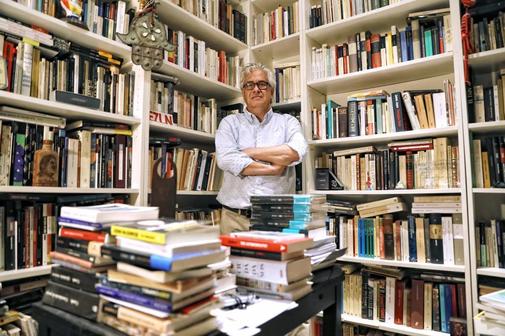Jordi Soler now offers a compass to the reader to orient itself between the noise of the current map. The essay Secret map of the forest (Debate) emerged from the "wonders" he discovered while walking with his dog Shrimp through mountains such as Tibidabo in Barcelona or through forests in Toronto, Mexico and Dublin. "Instead of running, spinning or swimming, I climb the same mountain every day on different routes .
P. The forest, both physical and also as a metaphor. Are you inviting the reader to enter it as a search?
R. Yes, I invite you to focus on what is happening around you, to become aware of the wonders that take place there, and that you cannot perceive but intuit, and also the dangers that lurk. Enter the trees with the tension that forms between the prodigy and the danger.
Q. In the book beats Henri Bergson's recommendation: you have to flow, follow "the continuous melody of our inner life".
R. It is an idea linked to the recipe that the reader finds in the Tao Te King , by Lao Tse, which comes to say that the origin of all problems is an obstruction that prevents the flow; Once the obstruction is removed the problem dissolves, life flows.
Q. As in the subtitle of the book, he proposes "see what is behind" , see beyond what we see.
A. Not literally; what I propose is to see knowing that in that forest, or in that landscape, there is a storm of matter that we are unable to perceive; The experience of seeing like this is important, it is similar to reading a book that you don't understand almost anything: what you don't understand ends up telling you something.
Q. And for that we must go out to find, as the medieval knights proposed?
A. That's right, and the central figure of that universe was the troubadour, a word that comes from trouver , which in French is to find; there is in the attitude of those people a lesson that should be useful to us today: it is not the same to go out to look, than to go out to find.
P. To find you have to venture, with the risk of losing.
A. Today everyone rejects the loser , that has taught us the American establishment : the only important thing is to succeed, as if the win was not the result of a series of defeats, and as if we were all winners; just make a rough account of the great successes of your life to realize that almost all the time you are a loser.
P. Andando says that "the great silence" occurs or arrives. Or the "empty memory" of San Juan de la Cruz. A mysticism?
A. Absolutely. The word mysticism comes from mýein , which in Greek means silence, and as Salvador Pániker reminds us: access to the present is a mystical act. With "great silence" I mean the voluntary act of suspending the talk we tell ourselves all the time inside the head, to be able to appreciate, in all its magnitude, what happens around us.
Jordi Soler, poet and author of 13 novels such as The Reds of Overseas and That Prince that I was , evokes what the sinking of the Titanic meant through what Ernest Jünger wrote. Soler considers that "the industrialized world went from arrogance to panic."
Q. Has that fracture been sutured?
A. Not only has it not been sutured, we continue to behave with the same pride and we will again reach the panic phase; just look at the lightness with which states and individuals are looking, just looking, phenomena such as global warming.
The writer abounds in the excess of current information that he considers a form of ignorance: "We have come here as an over-informed flock." And in front of this, he brings to mind several characters who made walking a way of being in the world, of finding and looking: Beckett and Giacometti, who despite being friends, wandered together through the streets of Paris without speaking because they were looking for great silence; Nerval, Baudelaire ...
P. Rimbaud, you say, walked all his life but was not going anywhere, he just walked away from where he was.
A. His displacements were very epic, but I think that everyone, deep down, is like him: we walked too far to return to the same place.
P. Affirms that we are governed today by "rottenness and meekness."
R. Without a doubt. The ruler obsessively looks at the polls to continue pleasing his people and is continually under pressure from economic powers. More than a ruler has become a manager.
P. Retrieves an idea of Octavio Paz from 50 years ago: leisure as a problem.
R. Leisure no longer exists; Today refers to that time we filled with television series, yoga, travel ... Leisure, which comes from the Latin word otium, rest, was the time for reflection, to be with oneself. Today it is intended that the citizen does not reflect, or be with himself.
According to the criteria of The Trust Project
Know more- literature
- culture
Literature Ian McEwan: "Utopia always ends badly, they become paranoid"
Literature Margaret Atwood: "Writing is an act of hope"
Literature Finishes the "unpleasant journey" of the ashes of Leopoldo Panero, five years after his death

